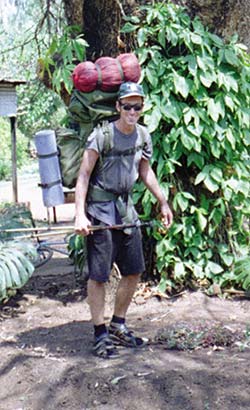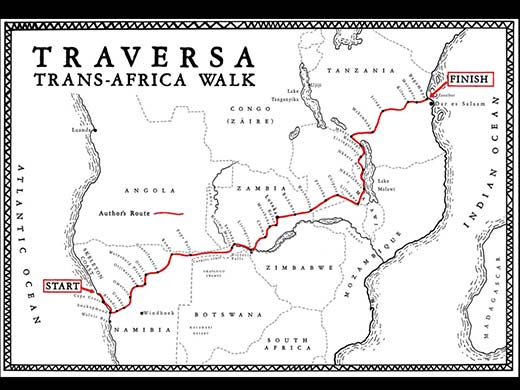Tuesday, 24 October 2023

A Solo Walk Across Africa
Speaker: Fran Sandham
 The guest speaker at the u3a Todmorden AGM and Members Meeting on Thursday 19 October was Fran Sandham, who presented 'A Solo Walk Across Africa'.
The guest speaker at the u3a Todmorden AGM and Members Meeting on Thursday 19 October was Fran Sandham, who presented 'A Solo Walk Across Africa'.
He began with a question he'd been asked a number of times before – why walk solo across Africa?
The idea came about when he was at a New Years Eve party, and was thinking about how he would spend the following year. As he thought about what was likely to be in store for him - much the same as the year about to end, he decided that he would do something totally different.
Fran anticipated that the idea wouldn't last very long but, instead, it was still there the following day, and remained. He identified two problems though: no experience of any sort of walking long distances, and no money. The next 12 months and more were spent saving every penny, working all the hours he could, anything to get the funds to, as he put it 'Live like a tramp when I finally got to Africa'.
But, why Africa? Fran, when a six year old boy, had spent two months in hospital and during that time read comics featuring Tarzan. He was fascinated by the images of Africa, and vowed to go there at some time in the future. As he grew older, his attention turned to real people who had explored the continent, in particular the journalist Henry Stanley and Dr David Livingstone – and what drove them, and other explorers, to endure the hardships and dangers of their expeditions.

Route across Africa
Fran briefly described his route - from Namibia on the southwest coast, to Zanzibar in the northeast. He had decided to start from Namibia to see and experience the 'Skeleton Coast', which was one of his numerous images during the presentation. Another of them showed one of the many ships and boats that had sunk, capsized or collided with the rocks along that particularly dangerous stretch of coastline.
He chose Zanzibar to end his walk, as this was also a famous and historic place used by explorers over the years, and also, perhaps infamous, as one of the biggest slave markets in Africa – Bagamoyo. In Swahili, Bagamoyo translates as 'Lay Down Your Heart'
Fran described how navigating his walk wasn't too difficult, the sun shone on the same side of his body during daylight hours, and he followed the compass in an easterly direction. His map was quite 'low tech' too – a Michelin map of central and southern Africa with a scale of 40 kilometres to one centimetre which nicely converted to his average of 26 miles walking per day.
He told us more about his actual walking the route. Initially, he was on his own for the most part, but as he went further east, more and more people, villages and settlements appeared. As for how he had prepared physically for the challenge, he again mentioned his year of preparation which included working in bookshops and hours of moving and carrying heavy boxes, grabbing every bit of overtime he could to boost his savings, and walking instead of using public transport; to such an extent that he was fitter than he'd ever been when he set out.

Nightly accommodation
In terms of dangers along the route, Fran said there were no problems with fierce animals, or particular dangers from wildlife. But he had been made aware of Lions attacking, and eating some parts of, people in a game reserve in eastern Namibia, which he planned to cross on his route. The game wardens confirmed these incidents, and warned him to keep away from the area concerned. But, at the same time, Fran suffered a stomach complaint which made him so weak that he had to stay in that area for a few days, thankfully without any encounters with the Lions.
He had also been warned beforehand about bandits who preyed on travellers in Zambia. He didn't meet any of these, and said that most, if not all, the people he met and spoke to along his walk were very friendly. He pointed out the main dangers to people in this part of the world – malaria and the outcomes of driving while drunk or on drugs.
Walking such a long distance, and for so long, will obviously cause discomfort to anyone – and Fran described the damage to his feet, which continued to blister for all of the journey, along with heat, hunger, thirst and exhaustion. But he said that all these things were offset by the sheer help and hospitality from the people of rural Africa.
Fran didn't record or calculate the exact distance on his walk, but estimated it to be around three and a half thousand miles. Subsequently he was asked whether, at any point, he thought of giving up. There was just the one occasion in the Namibian desert. It was scorchingly hot, his rucksack weighed around a hundred pounds, and he was exhausted. Fran said that this intention lasted about an hour, during which he'd reached a village, and had a cool drink and somewhere to sit.
He would still do the walk, but wouldn't do the carrying. His first thought was a trolley, but soon dismissed and replaced by getting a donkey. This was nowhere near the success he'd hoped for – progressing less than one mile in the following two months. The donkey's name was Soldam – which translates as 'where you get stuck'. He showed us a picture of Soldam – a speck almost at the horizon. Further tests with a mule, trolleys and a cart followed unsuccessfully before Fran decided he would continue the journey carrying his own gear after all.
During his trek, Fran started to attract crowds of children from whatever area he was in, who would accompany him for mile after mile – often posing for group photographs, which they would never actually get to see themselves. Their laughter, happy voices and company often cheered him up when he was recovering from yet another tiring days walking. Something else which helped in this regard was a local beverage – Chibuku beer, although he described it as 'a murky brown sour watery porridge with small brown chewy bits in it'.
Fran also encountered border guards along the way, most of whom were very friendly and helpful with the exception of one – at the border to enter Malawi. The guard insisted that Fran fill out an extensive form about who he was, along with details about most of his family and, most importantly, what was Fran's job in Britain? Fran had stopped being a bookseller, but he wrote this down just to speed things up, and the guard changed into his friend as he thought Fran said he was a boxer – the official's favourite sport.
Often asked about his best moment in Africa, Fran described how he felt at the start of his trek – the sense of freedom, excitement and anticipation, vast open spaces and being his own boss for a while. Reaching the end of his journey, he felt quite sad in a way that the adventure had come to an end.
After questions from the audience, this absorbing and enjoyable talk also came to an end, with well deserved applause.
The next Todmorden U3A Monthly Members Meeting will be on Thursday the 16th of November 2023, open to all fully paid-up members at the Central Methodist Hall. The speaker for this meeting is Dave Calverley, and is entitled: 'Numbers'.
Not yet a member? We're always delighted to welcome new members. Contact details: website at www.u3atod.org.uk or email at info@u3atod.org.uk.
Many thanks to Colin Sanson for this report
Previous U3A reports on the HebWeb - click here

